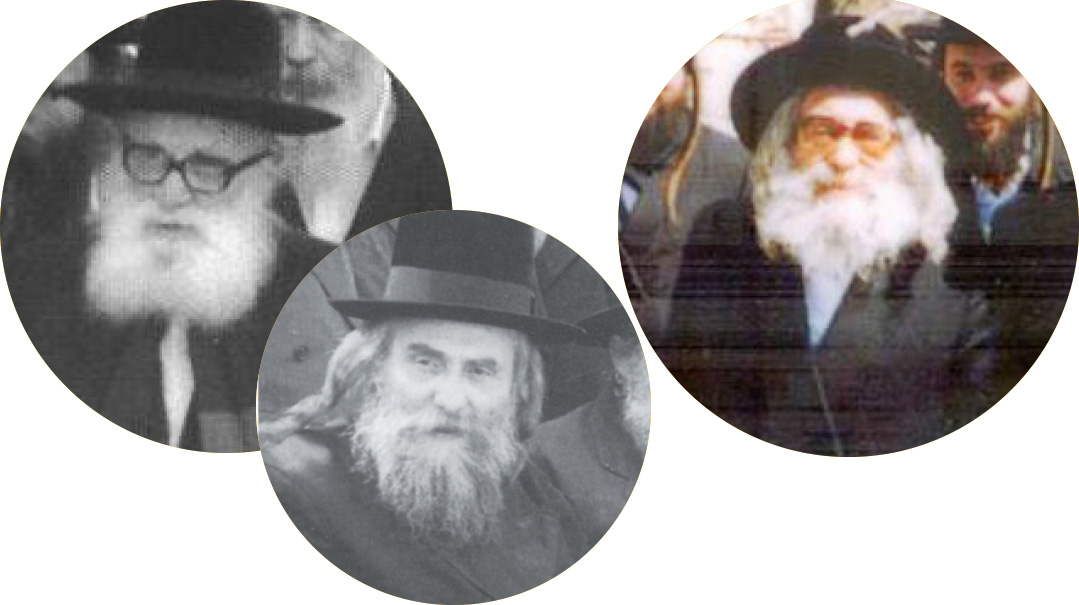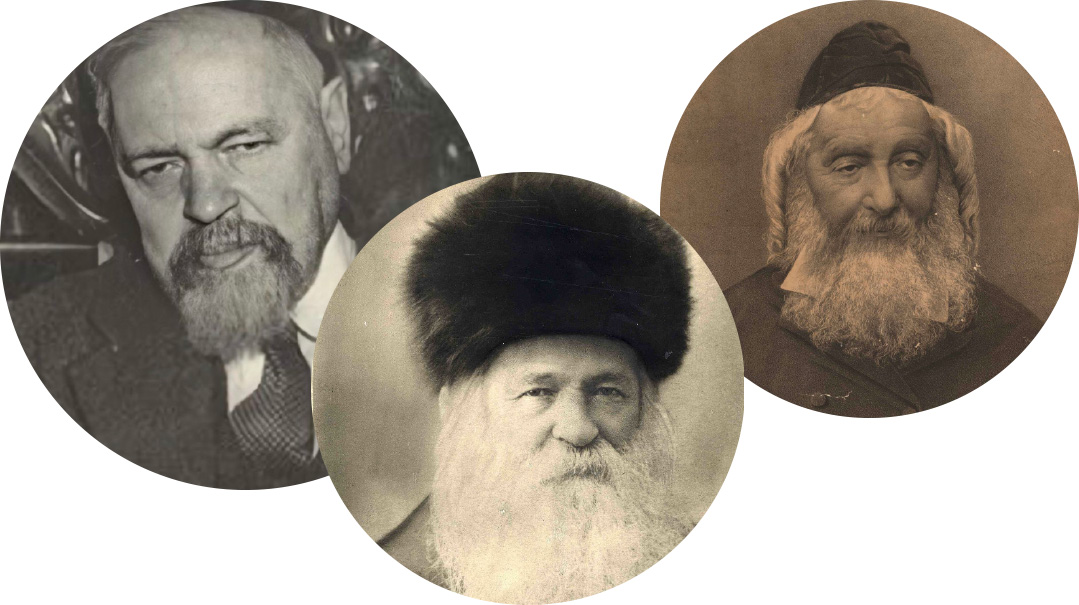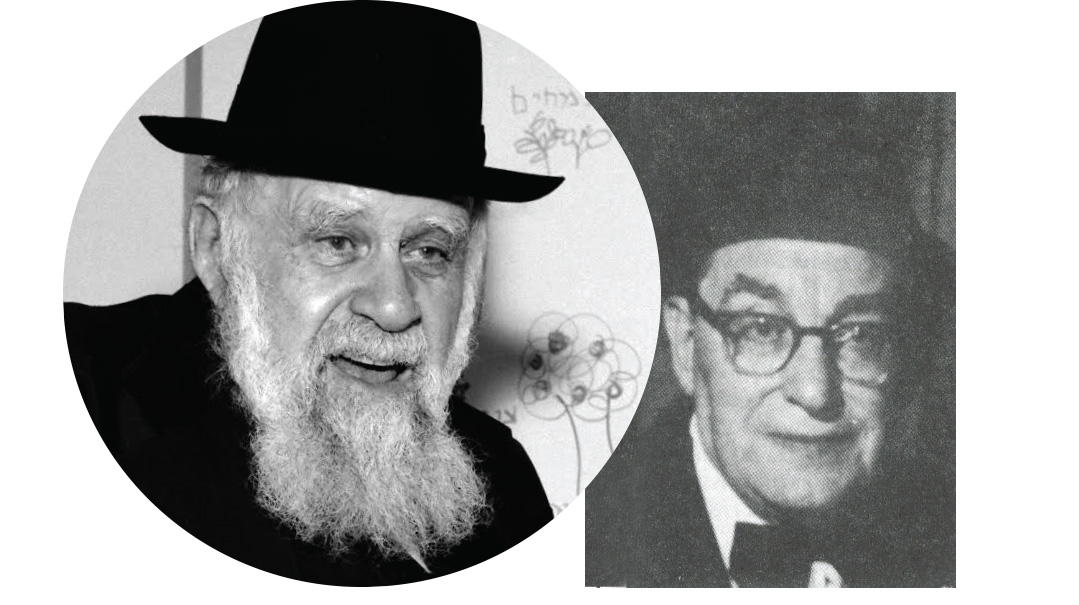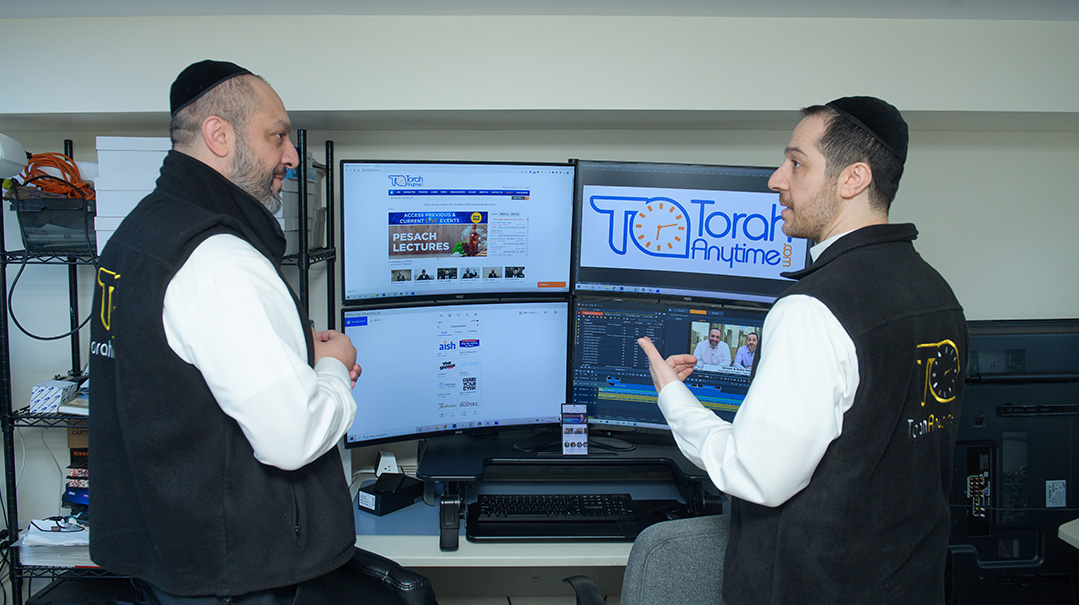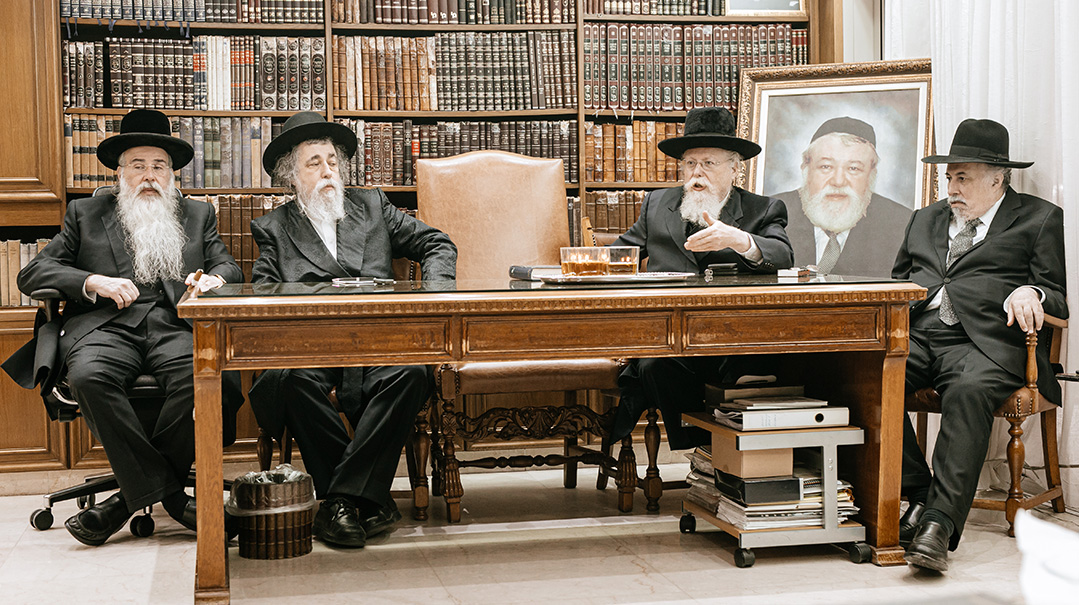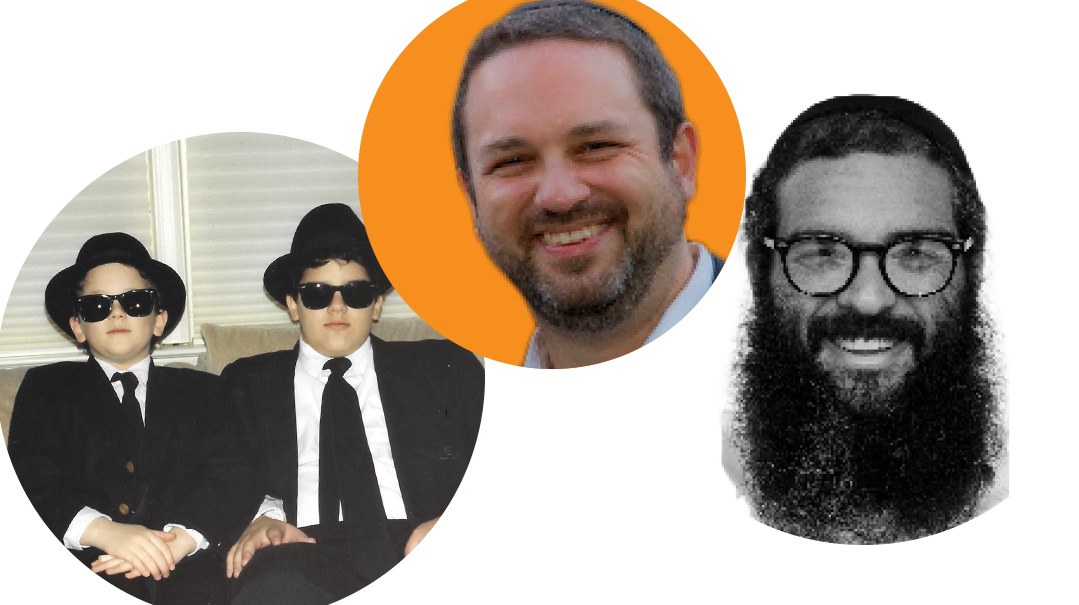Banded Together

These four brothers, separated by nearly a generation, say there was one doctrine their father baked into all their kishkes: a hatred for falsehood and a love for honesty
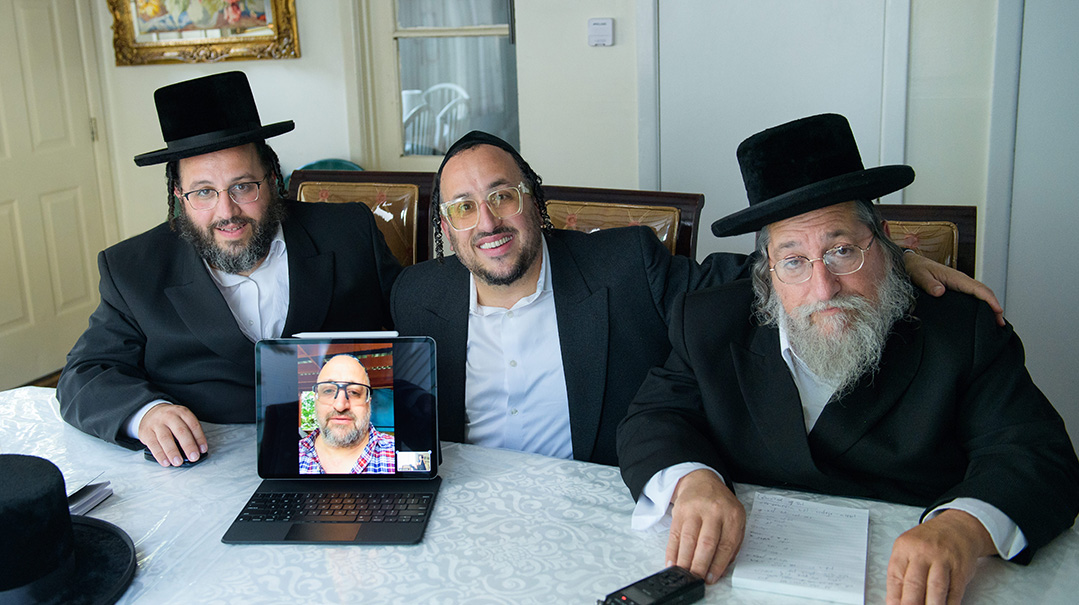
As I drive into New Square — the first fully chassidishe village in the United States — and pull up to a small house on the left, it’s hard to imagine a family of 14 once fitting between its walls. The house, similar to other structures in this village of about 8,000 residents, is no mansion. A small kitchen, its refrigerator adorned with pictures of the eineklach and pithy sayings, has a table with four places.
This structure — which served as the first location of the Skverer cheder — is the house in which Reb Reuven and Shifra Schmelczer built their family and raised a dozen children. Now some of those sons have gathered together in their childhood home to reminisce about the past, marvel at how far they’ve come in life, and put their own challenges and journeys into the context of loving parents who tried valiantly to maintain the strictures of the shtetl in a new world of open opportunities, while providing love and security even as their children made their own choices.
These four Schmelczer brothers, Zishe, Aaron (who joined from Montreal via Zoom), Lipa, and Velvel — two pairs from almost separate generations — might have different natures, but are still a close-knit clan.
Zishe, the third oldest at age 59, is the only one still living in New Square. An acclaimed chassidishe mechanech who educated a generation of children with over two dozen tapes and CDs, Zishe now works as a fundraiser for a variety of causes including the Skvere mosdos. He refused to look at the flickering computer screen even as he joked with Aaron. Zishe, who has developed an array of antics to elicit donations, described his goal in life as “making people smile.” A gifted singer himself, he recalls how the previous Rebbe, who was niftar in 1968, encouraged him to sing as a child and rewarded him with a sugar cube or money.
“Hey,” says Aaron, the next child after Zishe, “Now I find out now that you were an ashir already then? How come I didn’t get any money?”
But Aaron (the brothers affectionately call him Ari) has only praise for his brother Zishe, relating how he’s devoted his life to charity and making the world a better and happier place.
“He really does put a smile on people’s faces,” Aaron says. “Dancing, singing, entertaining, this is his whole life.”
Zishe was the first Schmelczer to go into music production; Lipa and Velvel credit him for their laying the groundwork for their own forays into the music world. He is the creator of the Middos Velt series, the Alef-Beis Velt series, the Cheder Velt series, the Kinder Velt series, Shofar Shel Moshiach, and a dozen other story albums. In fact, Lipa’s debut was as a child soloist on of Zishe’s tapes. And when Lipa later launched his own brand in 1998, he was hesitant about emphasizing the name Schmelczer, not wanting to steal Zishe’s thunder. It was the Skverer Rebbe who advised him to have “Lipa” in larger letters and “Schmelczer” in smaller print.
Aaron, child number four, lives in Montreal where he helps run Refuah V’Chesed, a chesed monolith that provides medical referrals and assistance. He visits patients in hospitals every week, putting a smile on their faces and food on their plates. He was especially devoted to the late Tosher Rebbe, tending to all his medical needs.
“Whenever I go to a chasunah,” Lipa says, “people come over to me and say, ‘You’re Aaron’s brother? Aaron took care of my father,’ or ‘Aaron saved my mother.’ He helps many, many people.”
Aaron’s history of community service began when he served as a volunteer firefighter in Monsey while still a teenager. He even received a Lifesavers Award. When he married and moved to Canada, he noticed a dearth of organizations helping people in hospitals. He began visiting patients, delivering food and good cheer until his activities developed into a full-service group with an ambulance, a warehouse of medical supplies, and a private clinic. He’s also a member of Montreal Hatzolah.
The second-to-youngest Schmelczer — albeit the first one that comes to most people’s minds — is Lipa, 42. Elazar Lipa, who adopted the name Lipa when he went public, is really the one who stamped the name “Schmelczer” on the broader world through his music and compositions.
Lipa recalls cheder as one long torture session. Somehow, he always found himself being put down by rebbeim and teased by other children. One rebbi, Lipa says, derisively predicted that if he continues on that path, “you’ll grow up to have a tchup and be a big singer who will get people to clap, but you’ll never be a talmid chacham.”
“I should give him a kvittel,” Lipa says with a sad laugh, “because that’s exactly what happened.”
Lipa credits his brother Zishe for introducing him to the world of professional music. Zishe had been told by the previous Rebbe to keep singing, and so the idea of an album was permissible in his father’s eyes. And Lipa, 17 years younger, was Zishe’s young guest at the studio when he recorded his children’s albums.
“My father wanted us all to become talmidei chachamim,” Lipa says. “And he certainly didn’t want me to go to a recording studio. But he agreed that ‘to help out Zishe, you can go.’ People would ask me to sing at dinners and things like that. My father would not allow me, unless Zishe was involved. He would say, ‘For Zishe you can go.’ ”
“The only thing I don’t like about Lipa,” Zishe confesses, “was that in the beginning I was the big man making tapes, and he came up and everyone started talking about him. I was no longer the Schmelczer everyone knew.”
“I’m so sorry, Zishe! You’re mochel me?” Lipa chimes in. “I didn’t call myself Lipa Schmelczer, because you were Zishe Schmelczer.”
But alas for Zishe, the troubles were not yet over. He was just getting over Lipa outpacing him when he met someone earlier this year who said, “Zishe, you should be as big as Velvel.”
Like Velvel? Velvel, the youngest of the siblings, is a beloved rebbi in Yeshivas Be’er Yeshaya in Monsey, a head counselor in the Munkacz summer camp in South Fallsburg, and host of a weekly program on Kol Mevaser that claims thousands of listeners. He, too, credits Zishe for part of his success — he says that whenever he needs creative ideas for activities each summer, Zishe has something to offer.
Despite the teasing, Zishe has no hard feelings. “We’re all Schmelczers and we all have a good heart,” he said. “That’s the main thing.”
Velvel’s program on Kol Mevaser, a Yiddish language call-in broadcast, has until recently focused on the Jewish music scene. Velvil’s conversations, however, are so popular that the owner of Kol Mevaser asked him to do an additional daily podcast discussing the news.
But music hasn’t left Velvel by the wayside. He’s a talented singer and lyricist, using those skills to badchan at many a rebbishe mitzvah tantz. When Lipa stopped producing the annual Purim play in Skver, Velvel took his place.
These four brothers, separated by nearly a generation, say there was one doctrine their father baked into all their kishkes: a hatred for falsehood and a love for honesty.
To understand the Schmelczer brothers, you must understand the Schmelczer parents. As we begin speaking, Shifra, the family matriarch, is puttering in the kitchen. Much of the conversation centers around her husband Reb Reuven, who passed away three years ago before Rosh Hashanah at age 88, but Mrs. Schmelczer seems like the type who’d take on the world to protect her brood.
“If anybody tried to do anything to us when we were little,” Aaron says, “she would run with us to their house and say, ‘How could you do such a thing?’ She would fight for her children to have everything.”
Mrs. Schmelczer is in the background, finishing up her daily Tehillim. “In every kapitel, I find a song from Lipa,” she says.
Her husband, Reb Reuven, was born in Budapest to Rav Moshe Yosef and Shosha Elka. He had two brothers, Rav Chaim Schmelczer a”h, a founding rosh yeshivah of Telshe Chicago, and Adoniyohu a”h, who passed away at age 12 from a ruptured appendix.
Reuven had two rebbeim during his early years to whom he credited his love for Torah and Yiddishkeit. Reb Yehuda Eckstein was his melamed when he started learning in Budapest at age six, and later, as a mature bochur in Switzerland during the war, Reuven began learning with Rav Dovid Heller. His gratitude toward his rebbeim was eternal, his sons recall. For 70 years, he would send Reb Yehuda Eckstein money before each Yom Tov, and would call Rav Heller every Chol Hamoed and share a new devar Torah he’d collected. He would go around each Purim raising funds for them, a practice he continued until he was 85, when both of them were niftar on the same day, two hours apart.
When Reuven was 15, his father was drafted into the munkatabor, the infamous slave labor camps set up by Hungary when it allied with Nazi Germany. Before his departure, Reb Moshe Yosef placed both of his children on his lap and begged them to remain erliche Yidden. It was the last time any of them saw him.
Shosha Elka, meanwhile, utilized every connection she could get to save herself and her two sons, finally securing three last-minute tickets to life on the famous Kastner transport, which detoured for several months to Bergen Belsen before arriving in Switzerland in December 1944. (The Satmar Rebbe and many other prominent figures were saved on that train as well.)
The three Schmelczers moved to New York and began life anew. Mrs. Schmelczer threw herself into chesed work, beginning the first bikur cholim in New York, which her grandchildren say later evolved into the Satmar Bikur Cholim. Reuven, meanwhile, learned in the yeshivah of Rav Moshe Neuschloss in White Plains. Then Rav Neuschloss was asked by the previous Skverer Rebbe, Rav Yaakov Yosef Twersky ztz”l, to lead his new yeshivah. And thus Reuven developed his lifelong attachment to Skver, which he would say “changed my life.”
The feeling was mutual: The Rebbe, Rav Moshe Neuschloss, and Reb Reuven formed an unusually intimate bond. “For Reuven Schmelczer,” the Rebbe once declared, “it was worth building the entire shtetl.”
Reuven was still single in 1954 when the Skverer Rebbe purchased a lot in Rockland County and founded the village of New Square. He very much wanted to live there too, but was concerned that by the time he’d marry, there wouldn’t be any vacant homes left in the small area. He therefore bought a tiny house and kept it for the time, besha’ah tovah, that he’d need it.
When the first Skverer cheder opened, the administrator approached the Rebbe and asked where in the small village could space be found to house it. “In Reuven Schmelczer’s house,” the Rebbe declared. “He won’t mind.” Indeed, Reuven did not mind, despite the wear and tear over the three years that his house served as a yeshivah for young children.
Reuven’s life revolved around the Rebbe. He never drove a car because when he asked the Rebbe if he should get a license, the Rebbe’s response was “Why?” Others would answer the Rebbe with a reason and get permission, but Reb Reuven did not question his rebbe.
The way the family has it, Reuven was the chassid, filling his life with Torah and tefillah, while his younger brother Chaim found his calling in the newly reestablished Telshe yeshivah in Cleveland. “Who cares if he is a chassid or a litvak, as long as he learns,” Reuven told his mother.
“That’s how he became litvish,” declares Zisha in a singsong tone. Velvel hurries to correct him. “Not just litvish, he became the Telshe rosh yeshivah in Chicago!”
“And my father,” Zisha adds, “was the chassid from New Square.”
Indeed, Rav Chaim is a legend in Telshe Chicago, serving alongside the other roshei yeshiva. But he and his brother got along wonderfully.
“My father was such a chassid and my uncle, the Telshe rosh yeshivah, was such a litvak,” Velvel says, “but it was so beautiful to see them meeting at a simchah and hugging each other. It was something to see.”
Reuven married Shifra and finally moved into the house he’d bought. As the only newlywed in the shtetl then, Mrs. Schmelczer was the one who’d help a kimpeturin, make pekelach for an aufruf or vachnacht, sell recordings of the Rebbe’s tishen. “Whoever wanted to get a recording of the Rebbe,” Aaron said, “came to the Schmelczers.”
The brothers grew up without much materially. Aaron recalls that once when he threw out some potato peels, his father peered into the garbage can and commented, “this is what I ate during the war.”
“I must say,” Aaron added, “that from all the hardships that we went through, we all made something out of ourselves. It made us more ambitious.”
While the brothers have each chosen their own path, their adoration for their father remains undiminished. He was a quiet and demanding father, but he loved them in his own way. He was the one who prepared breakfast for the children, rushing them to yeshivah before he took the bus to his job at the post office. He was the one who took them to dental appointments or eye doctor visits. His children remember getting Dos Yiddishe Licht pamphlets, the pages marked up with their names on top of various stories he thought each child would most enjoy.
He cared deeply for his children and never smacked — though he did frequently remind their rebbeim of the phrase, “spare the rod, spoil the child,” the children recall ruefully. He spent his days learning, and cared more about what a child learned that day than where he went or what he played. Lipa recalls getting ten dollars every week during the time he learned in Eretz Yisrael, along with a letter of love.
“I would pay $20,000 to see those letters again,” he says.
“He worked for 42 years in the post office,” Velvel adds, “but even while at work, his mind was always with us.”
The minhag in Skver is not to go to a parent’s kever. But Zishe says he does go, “because I look to him as a rebbe.”
Zishe explains: “He never had any ta’avos, he was a kadosh — it’s very hard for me to say how I know this, but I know. He was always learning. There was nothing that a rebbe does that he didn’t do. Except for one thing: He didn’t take kvittlach. And maybe he didn’t know how to take kvittlach from people.”
It’s clear that Lipa carries a special place in his parents’ lives. Of the four pictures hanging on the dining room wall, two feature Lipa. His father used to say, “How can I not love Lipa? You see my hat? You see my coat? Lipa bought these for me.”
Lipa began his career arranging the Purim plays at the Skverer Rebbe’s tish and composing songs for the chassidus — over a hundred compositions, he says. His livelihood was derailed over a decade ago, though, when rabbanim publicly opposed the modern flavor of his songs and dancing. A big concert scheduled for Madison Square Garden was canceled after a protest by some rabbanim. During the fallout, Lipa dropped out of the chassidic music scene and pursued a degree in social work at Columbia University.
Throughout those controversial, searching years, his family remained a source of support. Lipa remembers every insult as if it took place today and says they still sting. He remembers how he got a public dressing-down in shul, and how his father called him afterward to say that he had skipped a simchah of the Rebbe as a sign of solidarity for his son. Reb Reuven emphasized that he davened Maariv in shul that night wearing his regular weekday clothes.
“That was a very big thing for him because he was very attached to the Rebbe,” Lipa says. “He paid a price for it, but he very much wanted me to be accepted by the heimishe community.”
That opportunity arrived after a few long years. Lipa was at a chasunah where Beri Weber was singing, when Beri suddenly handed him the mic. He took it and tried producing the velvety sounds that once flowed effortlessly, but felt he was choking. He went home that night and began crying, then discovered with some research that stress harms the voice. He went to therapy to address those underlying issues, regained his voice, and began singing again for small groups.
He is now back in the business full time, and all at chassidishe weddings, he says. Lipa credits his turnaround to the love he felt gushing from his father’s neshamah since his passing three years ago.
“My father is doing things for me now in Shamayaim,” he says, while acknowledging that it was an entire complex series of events that led him to gradually regrow his long peyos and put his chassidishe garb back on. “Not that I wanted to be secular,” he hurries to assure, “but in my mind I wanted to be more like Teaneck.”
Aside from his music, Lipa also dabbles in art and composing. He says he’s composed enough songs for 20 years’ worth of albums. He refuses to get involved in hashkafah polemics, and has people checking up to make sure he davens and learns every day.
“Baruch Hashem, I’m now in a very good place,” he says.
The world sees Lipa as an unconventional entertainer, but the family sees him as someone who is misunderstood, someone who will go out of his way to help anyone. “When Mashiach will come,” Reb Reuven Schmelczer used to say about his son, “people are going to ask, ‘Where’s Lipa?’ And they will answer that Lipa is busy helping people.”
Aaron, too, admits to have been “in my own avenue” for a dozen years decades ago. During that time, his father would talk to him with the same caring as always, inquiring if he had parnassah and everything he needed. When Aaron fully reembraced the fold, his father was so excited, he gave him a 19th-century silver dollar that he had received from the previous Skverer Rebbe. “I want you to have it,” he told his son.
Even after his children married, Reb Reuven continued his displays of caring. He would call them in the morning to wake them. “I can hear him calling me now — ‘Eluzer Lipa, Eluzer Lipa’ — and I just melt,” Lipa says. “I even put a recording of his voice waking me up in one of my albums.”
“The Shabbos table at my father’s house… oy, if we could go back there now and have another Shabbos table with my father,” Aaron says, “We’d all choose that right now.” Reb Reuven had his songs that he chanted to himself on the way to shul, on the way home after Shabbos, at the seudos. The children until today still find themselves humming the “Amar Hashem l’Yaakov, ya, Tatteh, ya” that he would sing every Motzaei Shabbos.
The family has since dispersed over two continents but remains close-knit, speaking regularly, meeting at their mother’s house each month, and making sure each of them is taken care of. They might be outspoken, but they’re firmly loyal to each other — it’s the lesson they all learned from their father.
Lipa recalls a time when someone hung up signs all over Monsey with his picture covered by a large X. The entire family, all 12 siblings, set out late at night, and for the next ten hours, took down every single sign.
“We fight together, we live together, and we’re never upset at each other,” Velvel says. “And maybe in the end, that’s why we have the siyata d’Shmaya and succeeded.”
(Originally featured in Mishpacha, Issue 854)
Oops! We could not locate your form.
